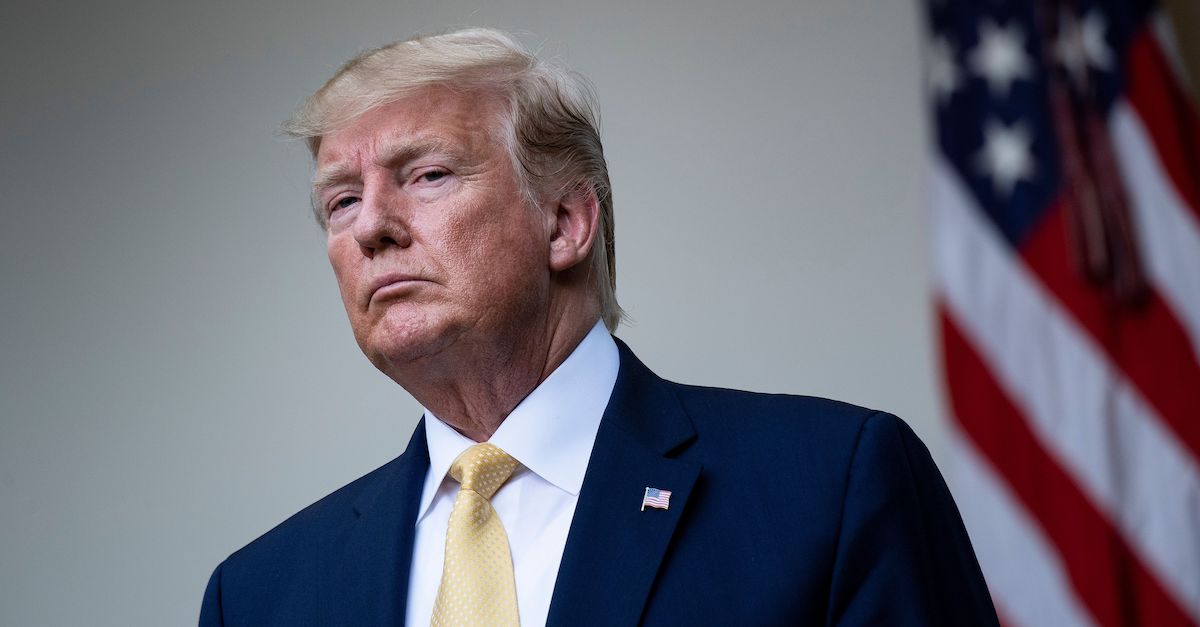
A federal court of appeals dealt President Donald Trump yet another loss in his ongoing legal battle against the Manhattan District Attorney’s Office on Wednesday by approving a year-plus-old subpoena seeking several years of the 45th president’s tax returns and other financial records.
Trump has long sought to bar the enforcement of the subpoena issued by Manhattan District Attorney Cyrus Vance in August 2019 against the president’s accounting firm, Mazars USA LLP.
Several courts have previously ruled in Vance’s favor–including the U.S. Supreme Court in a landmark case that determined a sitting president is not immune from state criminal process–but the president’s legal team has successfully stalled the release of his tax returns and other financial documents by keeping the controversy alive in the courts. The president has been aided in this stalling quest by Vance’s own actions; the New York prosecutor has repeatedly delayed enforcement of his own subpoena in order to afford Trump ample time to file legal appeals. This time is no different.
“Totally predictable,” said former acting U.S. Solicitor General and attorney Neal Katyal in a tweet. “Trump’s arguments here are so weak. He’s just trying to stall past the election. The Supreme Court shouldn’t let him.”
Vance has said he will decline to enforce his once-again legally-valid subpoena for 12 days to allow the president time to appeal the decision once again to the Supreme Court. That timeline likely puts the eventual enforcement of the subpoena against Mazars–and the release of Trump’s tax returns–beyond the date of the upcoming general election on November 3, which means the appellate ruling is a long-term legal loss but a short-term political victory for the president.
“Second Circuit gives green light to Manhattan DA subpoena for Trump financial docs,” noted Tulane Law Professor and political investigations lawyer Ross Garber via Twitter. “Only Supreme Court remains, but might not take case since it already decided key issues. Subpoena will be enforced. It’s just a matter of time. Maybe a very short time.”
The three-judge panel on the Second Circuit Court of Appeals was unmoved by Trump’s arguments that the New York City subpoena was overbroad and issued in bad faith.
Supporters of the president–and perhaps the president himself–are likely to have a field day with the panel’s composition. Circuit Judges Pierre N. Leval and Robert A. Katzmann were appointed by then-president Bill Clinton while Circuit Judge Raymond J. Lohier Jr. was appointed by then-president Barack Obama.
As Law&Crime previously reported, the panel was clearly and pointedly skeptical of Trump’s second-bite arguments here.
The president’s overbreadth argument was premised on the idea that Vance was really looking for information related to a series of hush money payments facilitated by his longtime former friend and fixer Michael Cohen in 2016–and that therefore seeking nearly a decades worth of tax returns went beyond the scope of such an inquiry. The appeals court definitively rejected that interpretation of Vance’s investigation–saying the idea “amounts to nothing more than implausible speculation.”
After striking away that “linchpin assumption,” the court noted, the rest of Trump’s arguments “fall short” of being plausible themselves.
One ancillary argument that has been the focus media attention is the president’s claim that Vance’s subpoena is all-but a carbon copy of a congressional subpoena–itself the subject of litigation in which Trump has repeatedly lost. The appeals court tidily dismissed this argument.
“To begin, there is no logic to the proposition that the documents sought in the Mazars subpoena are irrelevant to legitimate state law enforcement purposes simply because a Congressional committee considered the same documents relevant to its own investigative purposes,” the panel found. “The same set of documents could be useful for multiple purposes, and it is unreasonable to automatically assume that state law enforcement interests and federal legislative interests do not overlap.”
Trump also attempted to hang his legal hat on the notion that Vance was somehow acting in “bad faith,” largely on the argument that the Mazars subpoena was issued immediately after a similar subpoena–seeking the president’s tax returns–was issued to the Trump Organization at a time when Democrats across the country were keen to obtain his tax returns and were “increasingly dismayed over their ongoing failure” to do so.
The court said this argument, even if true, would not support “a plausible inference of retaliatory motive” on Vance’s part and that ultimately “this allegation fails the plausibility test.”
“We are similarly unpersuaded by the President’s reference to the ambient political motivations of third parties,” the decision goes on. “The motivations of unspecified ‘Democrats’ cannot be imputed to the District Attorney without specific factual allegations.”
With the law and numerous court decisions firmly on Vance’s side, legal experts say the president’s tax returns are all-but-assured to be before a grand jury–though there is some dispute as to when that is likely to occur.
“As expected—Trump loses (again) in his bid to block the Manhattan DA’s grand jury subpoena, but the decision won’t go into effect until after #SCOTUS acts (again), which won’t be for at least a couple of months,” tweeted University of Texas Law Professor Steve Vladeck.
But others think the news may come a bit quicker:
Likely they won’t https://t.co/c13psgwUqL
— Harry Litman (@harrylitman) October 7, 2020
Read the full opinion below:
10 7 20 Trump v Vance 2nd Circuit by Law&Crime on Scribd
[image via BRENDAN SMIALOWSKI/AFP via Getty Images]